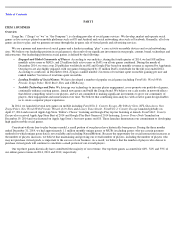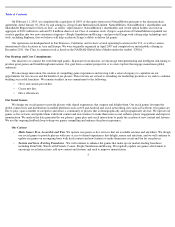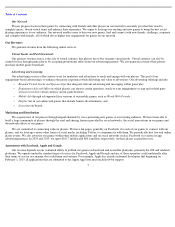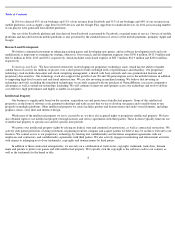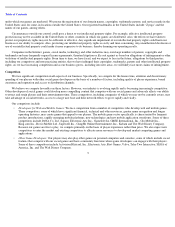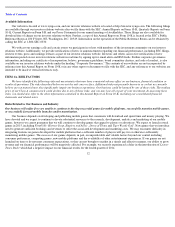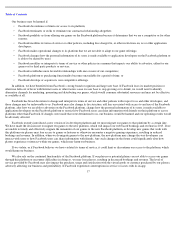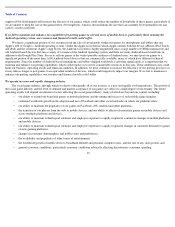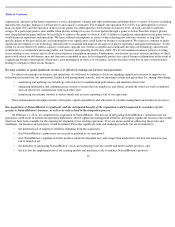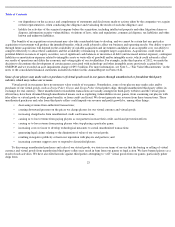Zynga 2014 Annual Report Download - page 17
Download and view the complete annual report
Please find page 17 of the 2014 Zynga annual report below. You can navigate through the pages in the report by either clicking on the pages listed below, or by using the keyword search tool below to find specific information within the annual report.
Table of Contents
We must continue to launch, innovate and enhance games that players like and attract and retain a significant number of players in order to
grow our revenue and sustain our competitive position.
We recently announced that we will launch six to ten new mobile games, including games in new categories in 2015, however there is a
risk that we may not launch these games or the other games we plan to launch in 2015 according to schedule, that these games do not attract and
retain a significant number of players or that these games will not monetize well. If we do not launch games on schedules or our games do not
monetize well, our business, revenue and bookings will be negatively impacted.
If our top games do not maintain their popularity, our results of operations could be harmed.
In addition to creating new games that are attractive to a significant number of players, we must extend the life of our existing games, in
particular our most successful games. Historically, we have depended on a small number of games for a majority of our revenue and we expect
that this dependency will continue for the foreseeable future. Our existing games compete with our new offerings and the offerings of our
competitors. Traditionally, bookings from existing games decline over time. For a game to remain popular, we must constantly enhance, expand
or upgrade the game with new features that players find attractive. Increased competition can result in increasing player acquisition and retention
costs. Constant game enhancement requires the investment of significant resources, particularly with older games, and such costs on average
have increased. We may not be able to successfully enhance, expand or upgrade our current games. Any reduction in the number of players of
our most popular games, any decrease in the popularity of our games or social games in general, any breach of game-related security or
prolonged server interruption, any loss of rights to any intellectual property underlying such games, or any other adverse developments relating
to our most popular games, could harm our results of operations.
Our business is intensely competitive and “hit” driven. If we do not deliver “hit” products and services, or if consumers prefer our
competitors’ products or services over our own, our operating results could suffer.
Competition in our industry is intense. Many new games are introduced in each major industry segment (mobile, web, and PC free-to-
download), but only a relatively small number of “hit” titles account for a significant portion of total revenue in each segment. Our competitors
range from large established companies to emerging start-
ups, and we expect new competitors to continue to emerge throughout the world. If our
competitors develop and market more successful products or services, offer competitive products or services at lower price points or based on
payment models perceived as offering a better value proposition, or if we do not continue to develop consistently high-quality and well-received
products and services, our revenue, margins, and profitability will decline.
Our quarterly operating results are volatile and difficult to predict, and our stock price may decline if we fail to meet the expectations of
securities analysts or investors.
Our bookings, revenue, adjusted EBITDA, player traffic and operating results have fluctuated in the past and could vary significantly from
quarter-to-quarter and year-to-
year and may fail to match our past performance or the expectations of securities analysts or investors because of a
variety of factors, some of which are outside of our control. Any of these events could cause the market price of our Class A common stock to
fluctuate. Factors that may contribute to the variability of our operating results include the risk factors listed in these “Risk Factors” and the
factors discussed in the section titled “Management’s Discussion and Analysis of Financial Condition and Results of Operations—Factors
Affecting Our Performance.”
In particular, it is difficult to predict when bookings from one of our games will begin to decline, the decay rate for any particular game,
which is the speed at which the popularity and player usage for a game declines and the commercial success of our new games. Our business
depends on our ability to consistently and timely launch new games or versions of games that achieve significant popularity and have the
potential to become franchise
14


